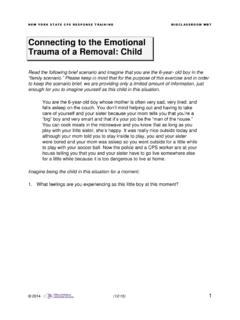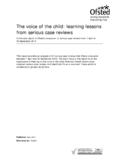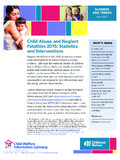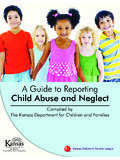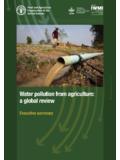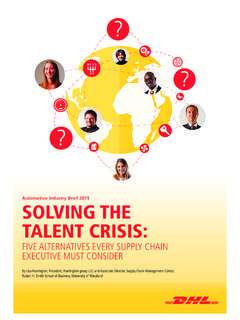Transcription of MANDATED REPORTER ONLINE TRAINING Text Version
1 MANDATED REPORTER ONLINE TRAINING Text Version 1 If this is an emergency, for example, young children are currently alone or being beaten, call 911 or your local police department, as they are able to respond immediately. To report a concern, call the New York State Child Abuse Hotline at 800-342-3720. Introduction Welcome to ONLINE MANDATED REPORTER TRAINING for identifying and reporting child abuse and maltreatment/neglect. This TRAINING is sponsored by the New York State Office of Children and Family Services (OCFS), committed to promoting the well-being and safety of our children, families, and communities. To report a concern, call the New York State Child Abuse Hotline at 1-800-342-3720. The purpose of this TRAINING is to provide you with the knowledge to make an informed decision about whether a situation involves child abuse or maltreatment/neglect, what your reporting obligation is, and how to go about making such a report.
2 In the course of this TRAINING , we will cover six primary subject areas. In the first part of the TRAINING , you will be introduced to the Child Protective Services (CPS) system, and given some background information on CPS. From there, we will move into looking at the questions of what is child abuse; and what is maltreatment/neglect. During these sections, we will define what a child is, what child abuse is, and what maltreatment/neglect is. You will also learn to identify common indicators. We will then look at some things to consider. This module will address the do s and don ts of talking with children, along with how to determine if there is reasonable cause to suspect child abuse or maltreatment.
3 Next, we will put your learning into real world examples in the learning exercises module, where you will be asked to evaluate your response as a MANDATED REPORTER to a particular situation. You will also evaluate four different scenarios and how you would respond to those cases. Finally, we will take you through what to expect when you make a call to the SCR, how to follow up on the report, and the local response of the Child Protective Services. MANDATED REPORTER ONLINE TRAINING Text Version 2 There are four main objectives that will be covered during this TRAINING : 1. Effectively report child abuse or maltreatment/neglect to the New York Statewide Central Registry (SCR) of Child Abuse and Maltreatment, also known as the Child Abuse Hotline; 2.
4 Evaluate situations to determine whether you have reasonable cause to suspect child abuse or maltreatment/neglect; 3. Identify the physical and behavioral indicators commonly associated with child abuse and maltreatment/neglect; 4. And describe the legal framework for the New York State Child Protective Services. A national study conducted in the 1980s concluded that many professionals do not report abuse and maltreatment/neglect because of two factors. The first is a general confusion or misunderstanding about the reporting laws and procedures. And the second is the lack of knowledge or awareness of warning signs and clues. Furthermore, in 1999, the University of Rochester conducted research for a campaign to increase community involvement to prevent child abuse and maltreatment/neglect, and improve reporting.
5 MANDATED reporters were included as a group in this study, and they disclosed two main reasons for why they did not fulfill their legal obligation to report. First, they were not clear about abuse or maltreatment/neglect as defined by New York State law. And second, they were often improperly influenced by their professional beliefs, values, and experiences. Do not apply your own beliefs, values, or personal experiences; Do act on the facts and your professional experience when measuring how to respond to a concern. As a result of these and other studies, we know that child abuse and maltreatment/neglect are under-reported, and that conversely, some situations that are reported to the SCR are more suitable for preventive services or other resources.
6 The following video transcript illustrates how the CPS system works to support families through crisis and stress in their lives. Working with a family to improve their lives and break the cycle of abuse and maltreatment/neglect is the purpose of intervention. As you review this transcript, remember that child abuse and maltreatment/neglect can occur in any family regardless of its education, ethnicity, or socio-economic class. The family in this video faced many difficult MANDATED REPORTER ONLINE TRAINING Text Version 3 challenges. Once CPS was involved, Philomena s life, and her children s lives, turned around. [Start of Transcript] [Setting: Philomena s kitchen] [Male Narrator] Philomena Allen wanted her daughters to have a different childhood than the one she and her mother had.
7 [Philomena] My mother s mother was not a very good parent. She had addictions of her own. It wasn t drugs at that time, but it was other things. Some significant things that my grandmother has done, my mother has done it, and I have done it. [Setting: Workplace conference room] [Male Narrator] Mary Ann Sangarten (MSW, CSWR) counsels families caught in the cycle of neglect and abuse, a cycle that begins when a child s plight is ignored. [Mary Ann Sangarten, Case Worker] I ve worked with so many adults who have talked about telling people and nobody helping them, and being so hopeless and helpless about the situation that they can t relate very well as adults. They have problems in their relationships, they have problems relating to their children, makes their children vulnerable to abuse by other people.
8 So it s a cycle that keeps going and going. [Male Narrator] Philomena was 10 when she left her mother s home. She had her first daughter at 16. By the time she was 25, she had three more daughters and a serious drug addiction. [Philomena] I left my kids with a family and I was just in the streets, and using drugs. The family that they were living with was not all that great, but it was better than me. It was better than what I was doing, so I left them there. [Male Narrator] Having abandoned her four daughters, six years later, she found herself pregnant again, and in jail. [Mary Ann Sangarten, Case Worker] I don t think most parents want to hurt their children, and they often regret that they ve hurt them, whether that s physically, sexually, emotionally.
9 They are not able to stop themselves, so it takes an intervention by an outside source, to go in and say, Wait a minute. We need to be really taking a look at how things are going and what s happening here. MANDATED REPORTER ONLINE TRAINING Text Version 4 [Philomena] You wouldn t think that you d get better when you go to jail, but that s when things started getting better for me. I realized that whether I was going to straighten up my life, or ever do whatever, get my kids back, or whatever, I still had an obligation to make sure this baby was not born addicted to drugs. [Setting: Interior of a church] [Male Narrator]While in jail, Philomena met Father Tony and developed a relationship that has continued to this day.
10 [Philomena] When I got out, I went to a woman s shelter. And it was actually on the same grounds as Saint Richard s Church. It was Bethany House. And things happened from there. I formed a relationship with my kids. I had my baby . [Male Narrator] She got herself off drugs, got her daughters back, and began the difficult process of pulling her family together. [Elizabeth, Philomena s teenage daughter] When my mom came to get me, it was like, a big relief, because I was scared. It was like, I was lost, and I blame that on, that s why I have so many issues. [Olivia, Philomena s teenage daughter] We try not to let it get in the way, but deep down inside, it makes a difference. Life would have been better if she wouldn t have left us, and I don t see how she could abandon her kids for drugs.


